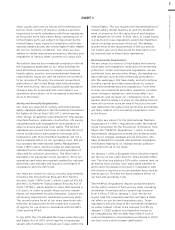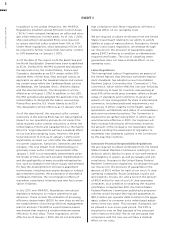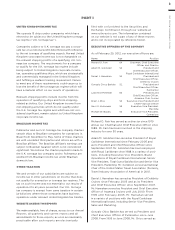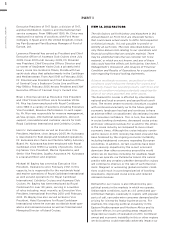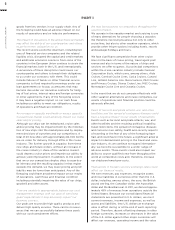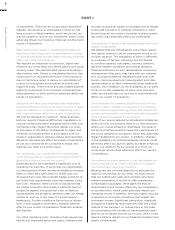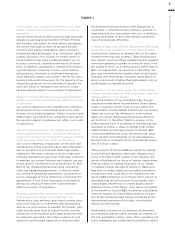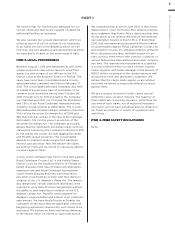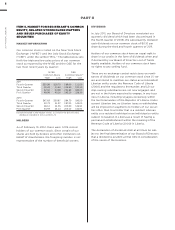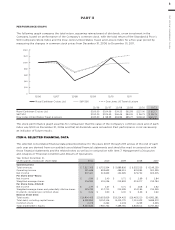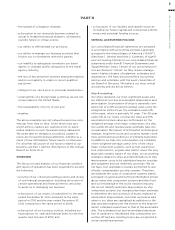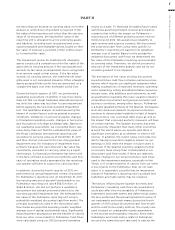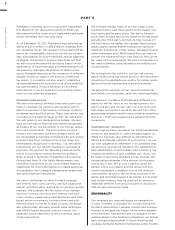Royal Caribbean Cruise Lines 2011 Annual Report Download - page 37
Download and view the complete annual report
Please find page 37 of the 2011 Royal Caribbean Cruise Lines annual report below. You can navigate through the pages in the report by either clicking on the pages listed below, or by using the keyword search tool below to find specific information within the annual report.
PART I
ROYAL CARIBBEAN CRUISES LTD. 33
A disruption in our shoreside operations or our infor-
mation systems may adversely affect our results of
operations.
Our principal executive office and principal shoreside
operations are located at the Port of Miami, Florida
and we have call centers for reservations throughout
the world. Although we have developed disaster
recovery and similar contingency plans, actual or
threatened natural disasters (e.g., hurricanes, earth-
quakes, tornados, fires, floods) or similar events in
these locations may have a material impact on our
business continuity, reputation and results of opera-
tions. In addition, substantial or repeated information
systems failures, computer viruses, cyber-attacks
impacting our shoreside or shipboard operations
could adversely impact our business. We do not carry
business interruption insurance for the majority of our
shoreside operations or our information systems. As
such, any losses or damages incurred by us could
have an adverse impact on our results of operations.
Failure to develop the value of our brands and differ-
entiate our products could adversely affect our results
of operations.
Our success depends on the strength and continued
development of our cruise brands and on the effec-
tiveness of our brand strategies. Failure to protect and
differentiate our brands from competitors throughout
the vacation market could adversely affect our results
of operations.
The loss of key personnel, our inability to recruit or
retain qualified personnel or disruptions among our
shipboard personnel due to strained employee relations
could adversely affect our results of operations.
Our success depends, in large part, on the skills and
contributions of key executives and other employees,
and on our ability to recruit and retain high quality
employees. We must continue to recruit, retain and
motivate management and other employees sufficient
to maintain our current business and support our pro-
jected growth. Furthermore, as of December 31, 2011,
80% of our shipboard employees were covered by
collective bargaining agreements. A dispute under
our collective bargaining agreements could result in
a work stoppage of those employees covered by the
agreements. A loss of key employees or disruptions
among our shipboard personnel could adversely
affect our results of operations.
Business activities that involve our co-investment with
third parties may subject us to additional risks.
Partnerships, joint ventures, and other business struc-
tures involving our co-investment with third parties,
such as our joint venture to operate TUI Cruises, gen-
erally include some form of shared control over the
operations of the business and create additional risks,
including the possibility that other investors in such
ventures could become bankrupt or otherwise lack
the financial resources to meet their obligations, or
could have or develop business interests, policies or
objectives that are inconsistent with ours. In addition,
actions by another investor may present additional
risks of operational difficulties.
A failure to keep pace with developments in technology
could impair our operations or competitive position.
Our business continues to demand the use of sophis-
ticated technology and systems. These technologies
and systems must be refined, updated, and/or replaced
with more advanced systems on a regular basis. If we
are unable to do so on a timely basis or within reason-
able cost parameters, our business could suffer. We
also may not achieve the benefits that we anticipate
from any new technology or system, and a failure to
do so could result in higher than anticipated costs or
could impair our operating results.
A change in our tax status under the United States
Internal Revenue Code, or other jurisdictions, may have
adverse effects on our income.
We and a number of our subsidiaries are foreign
corporations that derive income from a United States
trade or business and/or from sources within the
United States. Drinker Biddle & Reath LLP, our United
States tax counsel, has delivered to us an opinion,
based on certain representations and assumptions
set forth in it, to the effect that this income, to the
extent derived from or incidental to the international
operation of a ship or ships, is exempt from United
States federal income tax pursuant to Section 883
of the Internal Revenue Code. We believe that most
of our income (including that of our subsidiaries) is
derived from or incidental to the international opera-
tion of a ship or ships.
The provisions of Section 883 are subject to change
at any time by legislation. Moreover, changes could
occur in the future with respect to the identity, resi-
dence or holdings of our direct or indirect shareholders,
trading volume or trading frequency of our shares,
or relevant foreign tax laws of Liberia or Malta such
that they no longer qualify as equivalent exemption
jurisdictions, that could affect our eligibility for the
Section 883 exemption. Accordingly, there can be no
assurance that we will continue to be exempt from
United States income tax on United States source
shipping income in the future. If we were not entitled
to the benefit of Section 883, we and our subsidiaries
would be subject to United States taxation on a por-
tion of the income derived from or incidental to the
international operation of our ships, which would
reduce our net income.
Additionally, portions of our business are operated
by companies that are within tonnage tax regimes of
the U.K. and Malta. Further, some of the operations of
these companies are conducted in jurisdictions where


